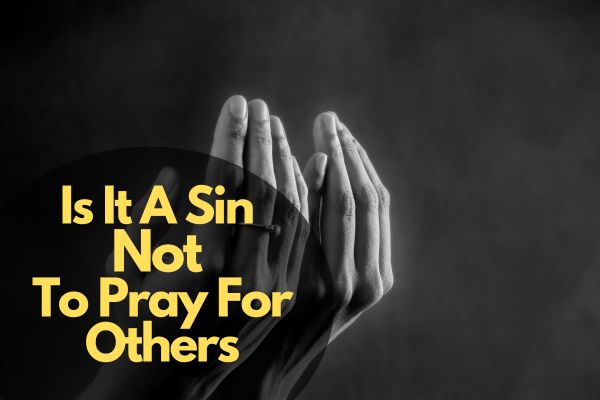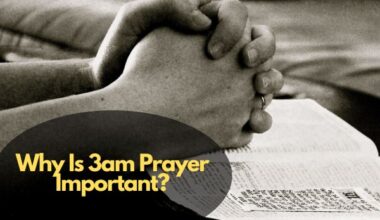Table of Contents Show
In matters of faith, prayer weaves a significant thread, connecting believers with the divine and fostering a sense of community. However, amidst the devout act of praying for others, questions often arise: Is it a sin not to pray for others?
This article explains the moral intricacies of prayer, exploring the implications of withholding intercessory prayers and examining the ethical considerations within various religious contexts.
Is It A Sin Not To Pray For Others
In the intricate fabric of faith, the question of whether it’s a sin not to pray for others finds no universal answer. Instead, it reveals the diverse and profound ways in which humanity grapples with spiritual responsibilities. Whether rooted in communal obligations or individual spiritual autonomy, the essence of intercessory prayer lies in the genuine intentions and heartfelt empathy that believers bring to their supplications.
Understanding the Concept of Intercessory Prayer
1 Definition and Significance: Intercessory prayer, a cherished tradition in many faiths, involves supplicating on behalf of others. It’s seen as an act of love, empathy, and communal support, embodying the spirit of compassion.
2 The Moral Responsibility: Many religious teachings emphasize the moral obligation of praying for others, promoting kindness, and selflessness. Intercessory prayer is often regarded as an expression of love for one’s neighbors and humanity at large.
Is It a Sin to Withhold Prayers?
Different religious traditions offer diverse viewpoints on whether it’s a sin to withhold prayers for others. Some assert the moral duty to pray for others, emphasizing the importance of collective responsibility. They argue that intercessory prayer is an expression of love and compassion, a way to fulfill one’s moral obligations.
1 Theological Perspectives: Different religious traditions offer diverse viewpoints. While some assert the moral duty to pray for others, others emphasize personal free will and the sincerity of prayers, suggesting that coerced or insincere prayers hold little value.
2 Intentions Matter: Within the moral debate, intentions play a pivotal role. The sincerity of one’s heart and the authenticity of prayers hold paramount importance. Forced or insincere prayers may not align with the true essence of intercessory prayer.
Cultural and Religious Variations
1 Cultural Influences: Cultural norms and societal expectations often shape attitudes towards intercessory prayer. Some cultures emphasize collective responsibility, nurturing a sense of community, and the idea that everyone should pray for one another. In contrast, other cultures prioritize individual agency in matters of faith, allowing people to choose whether they want to engage in intercessory prayer.
2 Religious Teachings: Religious scriptures provide guidance on this issue, but interpretations can vary. Some texts emphasize the duty to pray for others, promoting the moral aspect of intercession. Others highlight the importance of a personal relationship with the divine, leaving the act of intercessory prayer to individual discretion.
The Balance Between Personal Faith and Communal Expectations
Navigating the moral terrain of intercessory prayer involves striking a balance between personal faith and communal expectations. Spiritual autonomy grants every believer the freedom to navigate their faith journey.
1 Spiritual Autonomy: Every believer possesses spiritual autonomy, allowing them to navigate their faith journey. Some argue that enforced prayer might lack authenticity, urging for genuine, heartfelt prayers rather than obligatory gestures.
2 Community Bonds: On the flip side, communal prayers forge bonds within religious communities, nurturing a sense of togetherness, support, and shared faith. It reinforces the idea of looking out for one another in times of need.
Conclusion
In matters of faith, the question of whether it’s a sin not to pray for others remains subjective. It hinges on the interplay between individual beliefs, cultural influences, and religious teachings. While intercessory prayer is seen as a noble act, genuine intent and sincerity are paramount.
Navigating the moral terrain of prayer involves introspection, empathy, and a deep understanding of one’s faith. By fostering genuine compassion and authenticity in prayer, believers can uphold the moral essence of intercessory prayer while respecting individual spiritual journeys.
Frequently Asked Questions (FAQs)
Q1: Is it selfish to prioritize personal prayers over intercessory prayers for others? A1: Not necessarily. Personal prayers are essential for individual spiritual growth. While intercessory prayers are noble, sincerity and genuine intent matter most in any form of prayer.
Q2: Can I seek forgiveness if I’ve neglected to pray for others in the past? A2: Yes, seeking forgiveness and making a conscious effort to incorporate intercessory prayers in the future reflects a sincere heart. Many believe in the transformative power of repentance.
Q3: How can I balance my personal spiritual journey with community expectations of intercessory prayer? A3: Open communication within the community is key. Express your beliefs respectfully while being empathetic towards communal expectations. Finding a balance through dialogue fosters understanding.
Q4: Are there specific prayers for interceding on behalf of others in different religions? A4: Yes, many faith traditions have specific prayers for intercession. These prayers often focus on blessings, healing, protection, and guidance for others.








